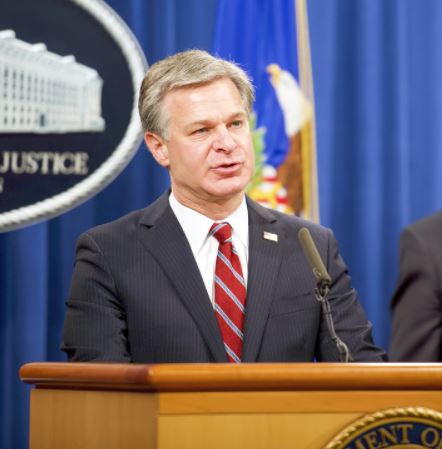FBI Director Christopher Wray wrote an op-ed for The Washington Post earlier this week. You can read it in full below.
But we wanted to highlight something that will be sure to upset a number of readers. Wray used the 20-year anniversary of 9-11 to caution Americans about not just those terrorists who were inspired through Islam to attack America, but also warned of the increased threat from “domestic terrorists.”
Here is that excerpt:
“But the risk of online radicalization is not limited to foreign terrorist ideologies. An expanding array of radical beliefs is increasingly inspiring domestic terrorists. Racial and ethnic ideologies, anti-government and anti-authority sentiments, conspiracy theories and personal grievances—the extraordinary range of dangerous narratives circulated online compounds the challenge of identifying and stopping violent extremists.”
The following op-ed by FBI Director Christopher Wray was published on The Washington Post’s website yesterday and appeared in the print issue today. Director Wray was an associate deputy attorney general in the Justice Department at the time of the 9/11 attacks.
Now, two decades later, the threats have evolved, but the hard-earned lessons of September 11, 2001, still provide the playbook for confronting today’s challenges.
After 9/11, the country united behind a common purpose. We focused on disruption—gathering intelligence to stop bad actors before they could attack. All levels of government removed barriers that had stifled collaboration and prevented information-sharing. Federal agencies strengthened relationships with state and local partners, whose front-line observations proved essential. And with the backing of the American people, a generation of public servants answered the call to tackle the new terrorism threat.
As a result of changes made in response to 9/11—and thanks to a lot of hard work by the FBI and our partners and some good fortune—we have not experienced another large-scale attack from a foreign terrorist organization on American soil. But make no mistake: As the Islamic State attack and tragic loss of 13 brave American service members and nearly 200 Afghans in Kabul last month painfully reminded us, the threat has not disappeared. To the contrary, over the past 20 years, as technology advanced and the world became more interconnected, familiar threats transformed and new ones emerged.
Terrorist attacks once required extensive communications and planning—which took time and created leads for investigators to pursue. Now terrorism moves at the speed of social media. Foreign groups spread propaganda online to inspire lone actors to attack using easily accessible tools—as in October 2017, when Sayfullo Saipov, an alleged Islamic State supporter radicalized online, plowed a rented truck through a crowd on a Manhattan bike path, killing eight people and injuring more than a dozen others.
But the risk of online radicalization is not limited to foreign terrorist ideologies. An expanding array of radical beliefs is increasingly inspiring domestic terrorists. Racial and ethnic ideologies, anti-government and anti-authority sentiments, conspiracy theories and personal grievances—the extraordinary range of dangerous narratives circulated online compounds the challenge of identifying and stopping violent extremists.
In addition to making attacks harder to detect, technology has enabled new threats. Twenty years ago, a team of terrorists would have had to successfully execute a complicated plan with a bomb or other conventional weapon to try to cripple the Bowman Avenue Dam in Rye Brook, New York, or shut down operations at Colonial Pipeline. But today, we have witnessed Iranian government hackers and ransomware criminals, respectively, do just those things from behind computers in safe havens abroad.
There is no question the threats have become more complex. Thanks to the dedication and sacrifice of the thousands of men and women who stepped up after 9/11, we know how to respond—by focusing on disruption, strengthening partnerships, and renewing a sense of shared responsibility.
Stopping the next attack remains the priority. But those who wish us harm continue to think of new ways to use technology against us. To guard against these ever-changing challenges, the intelligence and law enforcement communities have to innovate and think creatively.
As we learned after 9/11, collaboration is essential. Increasingly, that means law enforcement partnering with private citizens and companies. Interrupting fast-moving threats such as lone actors requires individuals to share information with the authorities when something seems amiss. Countering sophisticated cyberattacks requires companies to work with the FBI and not go it alone. Developing such relationships necessitates a joint commitment to building trust and improving communication.
Today’s realities demand recognition that we’re all in this together. The men and women of law enforcement are being asked to do more now than ever—at a time when their jobs are becoming increasingly dangerous. They need our support. To develop the next generation of those willing to run toward danger to protect others, we must rekindle the spirit of unity on display after 9/11.
As we mark the 20th anniversary of the September 11 attacks, we mourn the people we have lost, extend our sympathy to their families and loved ones, and express gratitude for those who sacrificed—both at home and abroad—to keep us safe. We owe it to them to recommit to the lessons learned through blood, sweat, and tears in the aftermath of 9/11.

















